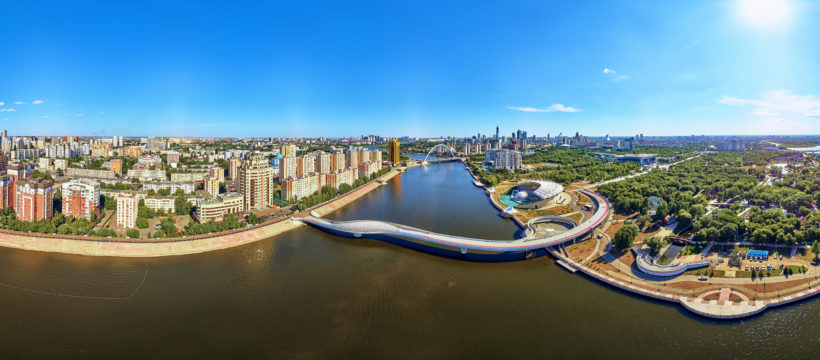A tailor-made integrated water master plan (IWMP), with modern management tools created by Tractebel experts to optimise development and operation of water resources, will go far to resolving the water-related issues of this special city.
Since March 2019 to August 2021 the experts have focussed on Nur-Sultan for the Astana City Akimat (ACA) Utilities Department. The goal being to develop an integrated investment roadmap up to 2050, inclusive of institutional, environmental, socio-economic, technical aspects.
Its realisation combines the expertise of Tractebel Germany in planning and management of water resources at a large scale with the know-how of GKW in state-of-the-art water infrastructure development and modernisation.
Less a case of “where to begin?” and more “how to continue?”
Nur-Sultan, formerly Astana, is the capital city of Kazakhstan. It was renamed in 2019 after the Kazakh president Nursultan Nazarbayev, who was responsible for the city’s visionary development on the banks of the Ishim River. As the economic hub of the country, its fast expansion continues. But equally rapid population growth and higher consumption have flagged an increasing pressure on city’s water resources and the environmental balance of the urban area.
These trends are aggravated by the climatic, topographic and geological conditions which make the city prone to flooding during seasonal snow melts and intense rainfall events. Summer droughts combined with often uncontrolled water withdrawal for industry or agricultural irrigation add to the pressure.
Facing these challenges, ACA has been investing in its water infrastructure since 2009 with the construction of new flood dykes, wastewater treatment plants, water supply and sewage networks. However, with nearly half of its households yet to be connected to sewage networks, these infrastructure investments all still need to be expanded to meet the demands of current and future populations, as well as to continue making the city more resilient to extreme climate events.
A masterplan and management tool tailor-made for a unique city
Establishing the basis of the IWMP first required diving into the assessment of existing infrastructure, operational performance and legal and institutional frameworks as well as a review of the existing pipeline of “hard” engineering projects outlined by local authorities. These were then complemented by additional project proposals aiming to build a more comprehensive approach to the known and expected challenges.
To this mix, the experts also introduced the concept of “softer” proven best practice approaches focused on better integrated management of water resources through increased collaboration between entities, raising awareness of populations, politicians and decision makers, and institutional training and capacity building.
All hard and soft measures were then screened and evaluated through a multi-criteria analysis and organised into implementation priority tiers, ranked by their scoring and investment requirements.
The further concept for an overarching planning and management tool, based on an initial content management system to later be developed into a decision support system, integrating data from different utilities and institutions, is also proposed.
“The value of having a clear plan towards the optimised development of infrastructure, with an integrated management of water resources, is not just that it helps solve and mitigate existing problems in Nur-Sultan. It will enable modern standards of quality water supply and sanitation city-wide. It will help to reduce the environmental and economic impact of extreme flood or drought events. Another important saving will be achieved by avoiding unnecessary or overdesigned works – and in turn resources and energy waste – which matters to everyone.”
Carlos Martins – Water Resources Engineer – Tractebel Germany
Company information
As one of the world’s largest engineering companies, Tractebel offers pioneering strategies for a climate-neutral future. Around 5,000 employees develop engineering solutions for complex projects in the fields of energy, water and urban infrastructure. Tractebel customers benefit from 150 years of experience and the local know-how of experts in Europe, Africa, Asia, the Middle East and Latin America. Revenue generated in 2019 was € 671 million. Tractebel is part of the ENGIE Group, an international low-carbon energy and services company.
Contact
Tractebel Engineering GmbH
Sabine Wulf, Head of Communications & CSR
Friedberger Straße 173
D-61118 Bad Vilbel
Phone: +49 (61 01) 55 – 0
info-de@tractebel.engie.com

